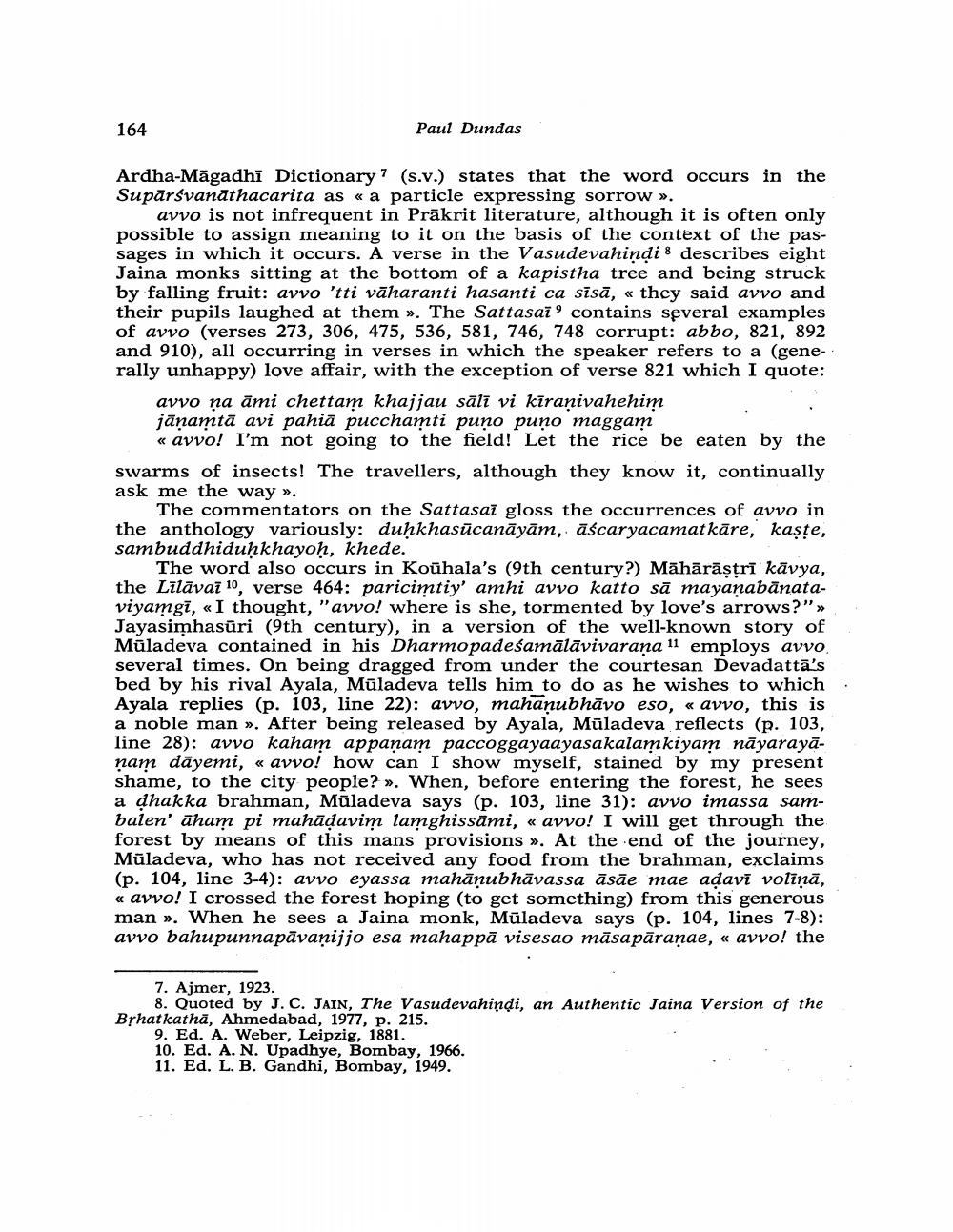________________
164
Paul Dundas
Ardha-Māgadhi Dictionary 7 (s.v.) states that the word occurs in the Supārsvanāthacarita as a particle expressing sorrow ».
avvo is not infrequent in Prākrit literature, although it is often only possible to assign meaning to it on the basis of the context of the passages in which it occurs. A verse in the Vasudevahindi 8 describes eight Jaina monks sitting at the bottom of a kapistha tree and being struck by falling fruit: avvo 'tti vāharanti hasanti ca sisā, « they said avvo and their pupils laughed at them ». The Sattasai' contains several examples of avvo (verses 273, 306, 475, 536, 581, 746, 748 corrupt: abbo, 821, 892 and 910), all occurring in verses in which the speaker refers to a (generally unhappy) love affair, with the exception of verse 821 which I quote:
avvo na āmi chettam khajjau sālī vi kīranivahehim jānamtā avi pahiā pucchamti puno puno maggam
« avvo! I'm not going to the field! Let the rice be eaten by the swarms of insects! The travellers, although they know it, continually ask me the way ».
The commentators on the Sattasai gloss the occurrences of avvo in the anthology variously: duhkhasūcanāyām, āścaryacamatkāre, kaste, sambuddhiduḥkhayon, khede.
The word also occurs in Koühala's (9th century?) Māhārāstrī kāvya, the Līlāvai 10, verse 464: paricimtiy' amhi avvo katto sā mayanabanataviyamgi, «I thought, "avvo! where is she, tormented by love's arrows?" Jayasimhasüri (9th century), in a version of the well-known story of Mūladeva contained in his Dharmopadeśamālāvivarana 11 employs avvo several times. On being dragged from under the courtesan Devadattā's bed by his rival Ayala, Mūladeva tells him to do as he wishes to which Ayala replies (p. 103, line 22): avvo, mahanubhāvo eso, « avvo, this is a noble man ». After being released by Ayala, Mūladeva reflects (p. 103, line 28): avvo kaham appaņam paccoggayaayasakalamkiyam nāyarayānam dāyemi, « avvo! how can I show myself, stained by my present shame, to the city people? ». When, before entering the forest, he sees a dhakka brahman, Mūladeva says (p. 103, line 31): avvo imassa sambalen' āham pi mahāļavim lamghissāmi, « avvo! I will get through the forest by means of this mans provisions ». At the end of the journey, Müladeva, who has not received any food from the brahman, exclaims (p. 104, line 3-4): avvo eyassa mahānubhāvassa āsāe mae adavi voliņā, « avvo! I crossed the forest hoping to get something) from this generous man ». When he sees a Jaina monk, Mūladeva says (p. 104, lines 7-8): avvo bahupunnapāvanijjo esa mahappā visesao māsapāraṇae, « avvo! the
7. Ajmer, 1923.
8. Quoted by J.C. JAIN, The Vasudevahindi, an Authentic Jaina Version of the Brhat kathā, Ahmedabad, 1977, p. 215.
9. Ed. A. Weber, Leipzig, 1881. 10. Ed. A. N. Upadhye, Bombay, 1966. 11. Ed. L. B. Gandhi, Bombay, 1949.




